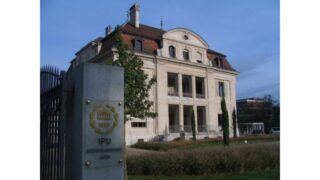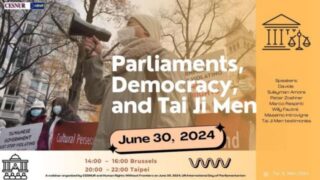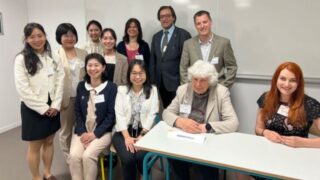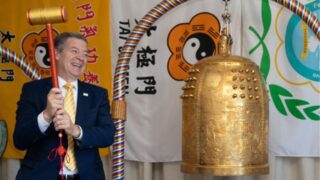Tai Ji Men is guilt by innocence. Cleared from all accusations, it continues to be harassed by corrupt bureaucrats who live outside of reality.
by Marco Respinti*
*A paper presented at the webinar “For a Correct Information on the Tai Ji Men Case,” co-organized by CESNUR and Human Rights Without Frontiers on September 29, 2022, after the International Day for Universal Access to Information (September 28).


“Quid est veritas?,” “What is truth?” This question still resonates in the world after two thousand years, having been first uttered by Pontius Pilate, the Roman governor of Judaea from 26/27 to 36/37 AD (see John 18:37). Pilate used this formula to answer Jesus when the latter told him, in so many words, that he came “into the world” to “bear witness to the truth” (John 18:37). Some Christian churches believe that Pilate later converted to Christianity. Some even venerate him as a martyr and a saint, but his famous question is still quoted as the very epitome of skepticism.
Living in the age of relativism
In the post-modern world, though, classical skepticism, which basically repeats Pilate’s question and claims that what truth is, is something impossible to know, has been supplanted by relativism, which goes even further. Relativism argues that either truth does not exist, or all have their own individual truths. Being totally subjective, the relativistic concept of truth becomes an empty can. In this scenario, what is true for a person is false for another—at the same time and in the same respect. The principle of non-contradiction elaborated by Greek philosopher Aristotle (384—322 BC) no longer applies. A somewhat more moderate version of relativism limits itself to claim that perhaps truth exists but we cannot know it. The more radical contemporary relativism, on the other hand, has completely abandoned the use of “truth” and regards it as a meaningless and useless word.
Sociologists and those who study cultural hermeneutics have adopted the expression “post-truth.” It describes an intellectual climate where objective facts are less important than subjective beliefs, and even mere emotions. Feelings become more important than the hard facts of reality, because for those living in the “post-truth” an objective reality no longer exists.
This is not just an academic question. Serious problems arise when “post-truth” dominate decisions how to vote in elections, what to believe in news services, what is science and what is not, how to buy and sell goods, and many others.
God is dead
The concept of “adaequatio rei et intellectus,” or the “correspondence between reality and intellect,” seems to have been originally formulated by neoplatonist Egyptian philosopher and physician Isaac Israeli ben Solomon (855–955), or Persian polymath Ibn Sina (980–1037) known as Avicenna. It gained fame through 13th-century Catholic philosopher Thomas Aquinas (1225–1274). In the post-truth world of hyper-relativism, that fundamental description of how the human mind works and gains knowledge is completely lost.
Instead of reasoning upon hard facts, the post-modern mind compels facts to obey to the idea that human reason has of them. Ultimately, facts can be abandoned and replaced by mere subjective feelings. It is sufficient to have a feeling of any sort about anything to compete in what was before known as the world of ideas.


Some claim that the ancestor of modern radical relativism and post-truth was German philosopher Friedrich Nietzsche (1844–1900), who raised irrationality to the rank of a key tool of knowledge and interpretation. They may well be right. When Nietzsche famously shouted that “Gott ist tot,” or “God is dead,” in his 1882 book “The Joyous Science,” where he repeated the tremendous sentence of his book “Thus Spoke Zarathustra,” published in 1883–1892, he of course did not mean that God was truly, really, physically dead, as if someone had killed him. Similarly, his book of 1895 (but written in 1888) “The Antichrist” was not some piece of Satanist literature. He explained openly all this when, again in “Thus Spoke Zarathustra,” Nietzsche wrote, “Dead are all the gods,” probably including among the dead Satan himself. It was not Satanism—in fact, it was something worse.
Well versed in classical philosophy, which he planned to turn on its head, Nietzsche knew all too well that the god of the philosophers is the fullness of being and the sum of all perfections, the source of morality and the ultimate criterion of truth. Thus, when he proclaimed God, or “all the Gods,” dead, arguably including Satan as the anti-God, he meant that dead were all parameters of objective truth, and ultimately truth itself. It is common to see Nietzsche as a precursor of Nazism, but in fact we can find his posterity on both the right and the left of the political spectrum. More precisely, we can argue that certain right-wing and left-wing currents find in Nietzsche their meeting point.
Nietzsche’s target is not God or Christ, it is truth and reality. God or Christ or any other spiritual guiding force or superior governing principle “die” together with truth, and as a consequence of the death of truth. Having killed truth, the German philosopher could triumphantly declare the grand opening of a new age, the age of the “Umwertung aller Werte,” or the “transvaluation of all values.” He announced in his book “The Antichrist” that, once truth had been killed, values had lost their roots and anchors and were now totally transformed. It was a sabbath of post-truths.


The categorical imperative we need
The impact on communication of knowledge and the transmission of news is incalculable. They are a crucial influence on education and progress. Coming to a consensus on issues of fact is impossible if many do not believe truth exists.
The link with the Tai Ji Men case is obvious. The Tai Ji Men case has a peculiarity. There is a penalty but there is no crime—a spectacular case of guilt by innocence. After having been harassed and had their property seized, Tai Ji Men Shifu (grand master) and dizi (disciples) were cleared from all accusations by the highest courts of law in Taiwan. Their decisions established, beyond any doubt, that they had not committed the crimes they were accused of, or, to put it more simply, that they had not committed any crime, including tax evasion. Yet some corrupt bureaucrats in the taxation department of the Taiwanese government continued to issue against Tai Ji Men bills that could theoretically be justified only if Tai Ji Men Shifu or dizi had committed a crime. Let me repeat that they didn’t. They did not commit any crime.
However, no matter how innocent Tai Ji Men was, no matter what the laws said, no matter what hard facts were, Tai Ji Men was regarded as guilty because some branches of the Taiwanese government refused to acknowledge the truth. They were neither blind nor deaf. They simply lived beyond the facts, in the situation of post-truth.
The Tai Ji Men case has of course its reality based on hard facts, evidence, and legal truth. But the post-truth bureaucrats do not care. They only care about their individual feelings and interests, oblivious to the immense damage and suffering they cause.


Spreading correct information on the true reality of the Tai Ji Men case is crucial. However, it is only possible if you believe that hard, objective truth exists beyond subjective perception. Better, if you believe that any perception, or judgment or evaluation, must proceed from hard, established facts.
As other webinars on the Tai Ji Men case concluded, the only possible solution for the Tai Ji Men case is political. The truth is out there, the hard facts are there, yet post-truth zealots are stubborn in ignoring them all. Only a categorical imperative of an exquisite political nature, to borrow a famous expression from German philosopher Immanuel Kant (1724–1804), can liberate our field from the rubbish of post-truth, restore communication, pay tribute to reality as the mother of all truth, and redress the wrongdoings that continue to hit Tai Ji Men.
What Tai Ji Men now needs is a political act stemming from political will. Is there such a will in today’s Taiwan?









